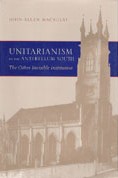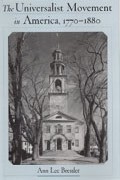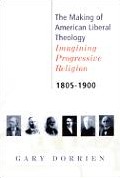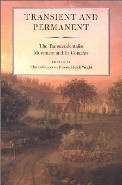bookshelf |
November/December 2002 |
|||||
Focus on historyby Christopher L. Walton
The history of Unitarian ideas has attracted considerable attention over the years from non-Unitarian scholars, but Universalism has not often been taken so seriously. Thus Ann Lee Bressler's The Universalist Movement in America, 1770-1880 arrives like a breath of fresh air. Bressler examines the early theology, social context, and transformation of Universalist Christianity. I knew the Universalists taught that hell was no one's ultimate destination; what I didn't know was how truly radical this idea was in post-revolutionary America. For Universalists, Bressler writes, "one's lot was cast with the rest of the human race; personal will and character, in the end, mattered not at all. These were not entirely glad tidings for an age of self-made men."
As refreshing as Bressler's book is, we can be grateful that the Unitarian Universalist Historical Society has published a new edition of George Huntston Williams's American Universalism (1971, Skinner House Books 2002; $14), which brings the history of Universalist ideas forward to the creation of the UUA in 1961. The Universalism of Adin Ballou "was already a museum piece" when the Universalists celebrated their centennial in 1870 — Bressler's conclusion, too — but Williams helpfully describes three other theological outlooks that had emerged among the Universalists and explores their views on war, temperance, prison reform, capital punishment, gender, and missions. Williams, who died in 2000, was a renowned historian of Christianity and an ordained Unitarian minister.
For many Unitarian Universalists, the theological encounter with Christianity ends here — or with twentieth-century Humanism. But Parker's was not the last word in liberal theology. Other liberal Christians in the nineteenth century embraced evolution, began to think of scripture as metaphoric, championed social and economic reform, and developed academic models for thinking critically about religion — without following Parker into abstract Transcendentalism. Dorrien presents their stories sympathetically and critically, helping us see how nineteenth-century liberal theologians responded to the challenges of their times. They were human, some embarrassingly so. But Dorrien sees them — Unitarians and liberal Christians alike — as part of "the most creative and influential tradition of theological reflection since the Reformation." I can't wait to follow the story through the next hundred years in Dorrien's second volume. I'm also looking forward to Dean Grodzins' biography of Parker, American Heretic: Theodore Parker and Transcendentalism (Univ. of North Carolina Press, 2002; $39.95), due out in December. Grodzins is assistant professor of history at the UUA's Meadville Lombard Theological School in Chicago and editor of the Journal of Unitarian Universalist History. Other recent history titles by Unitarian Universalists include:
Unitarian Universalism: A Narrative History. By David E. Bumbaugh. Meadville Lombard Press, 2000; $15. This engaging, accessible, and succinct history spends equal time on the European roots and American development of our two liberal traditions. The author is associate professor of ministry at Meadville Lombard Theological School. Although trapped inside an amateurish cover, this excellent book is also the first publication of the Meadville Lombard Press, the imprint of the UUA-affiliated seminary. Seven Sons: Millionaires and Vagabonds. By Theodore A. Webb. Trafford Publishing, 1999; $22.91. The seven sons of Israel and Martha Washburn of Livermore, Maine, proved to be extraordinary public figures in the nineteenth century. Three served in Congress and as governors; another was secretary of state; yet another became a prominent newspaper editor. All were dedicated Universalists. This book describes a remarkable family's history and influence. The author is a retired Unitarian Universalist minister. A Saloonkeeper's Daughter: A Novel. By Drude Krog Janson. Translated by Gerald Thorson. Ed. by Orm Øverland. Johns Hopkins Univ. Press, 2002; $18.95. Young Astrid Holm's comfortable life in Norway is thrown into turmoil by her family's bankruptcy in 1879. She finds herself living above a saloon in Minneapolis, struggling to find her vocation. In time she discovers her true calling, as a Unitarian minister! First published in 1887 — in Norwegian — by the wife of the Rev. Kristofer Janson, a Unitarian minister, this novel appears for the first time in English. Christopher L. Walton is senior editor of UU World.
| ||||||
Copyright © 2002 Unitarian Universalist Association | Privacy Policy | Contact Us | Search Our Site | Site Map
Last updated November 21, 2002. Visited times since November 6, 2002.



